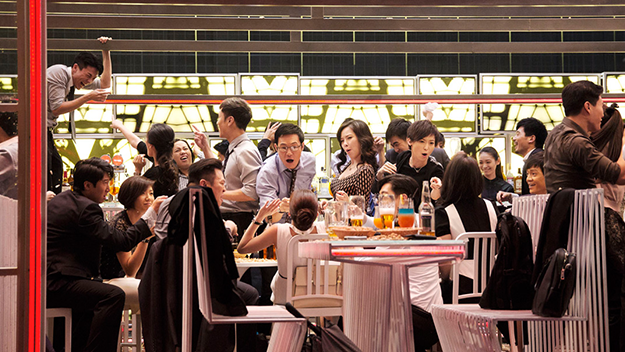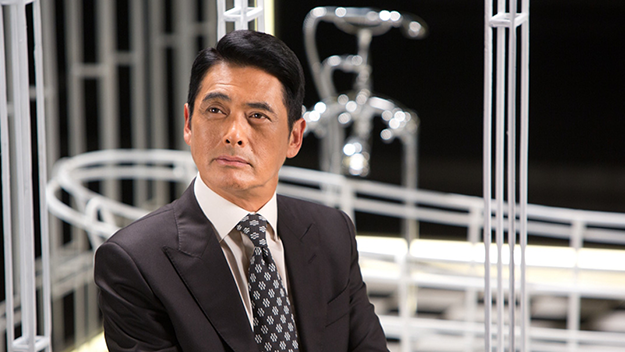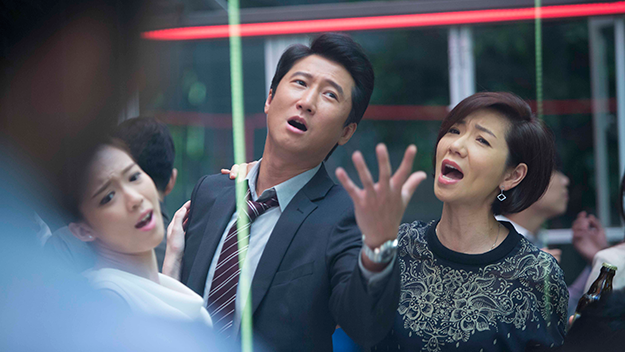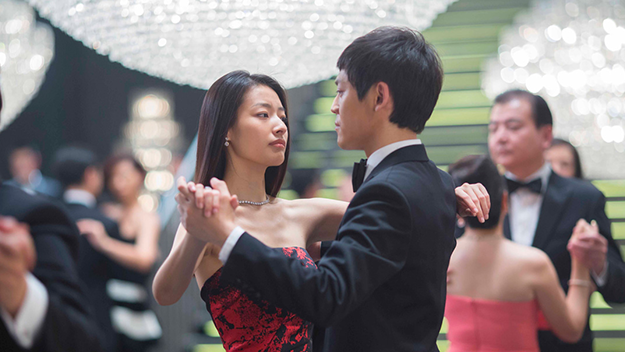Review: Office

“Are you fine being a corporate slave? Are you fine working until you drop?” Though the lines sound like a quote from the recent New York Times exposé of Amazon’s punitive workplace policies, it’s actually the chorus to a peppy tune in the new Chinese musical Office, directed by Johnnie To. This boldly designed experiment creates a Lucite world of total visibility: offices, homes, and restaurants are all rendered as translucent cubes through which the panicky financial sector circulates, burning off stress through song. Office follows the machinations of a multinational corporation trying to go public in 2008, just as Lehman Brothers was going bankrupt. The lives of everyone from the chairman down to the entry-level drones are sent into upheaval as the world economy flushes down the tubes.
The story originated in Sylvia Chang’s 2009 stage play Design for Living, a popular four-hour drama (no relation to the Noel Coward work) about a female CEO dealing with the Great Recession. It was Chang’s debut as a playwright, after decades as a film actress in Taiwan and Hong Kong (Eat Drink Man Woman). She wanted to bring a musical version of Design for Living to the screen, and after writing the script she looked to her colleagues from the 1989 hit melodrama All About Ah-Long: Chow Yun-fat, director To, and pop star/composer Lo Dayu.

Chow Yun-fat is Chairman Ho, the slickly dressed founder of Jones & Sunn, an ascendant financial services firm in the process of setting up an IPO. His wife is in a long-term coma, and he’s been having an affair with CEO Chang (Sylvia Chang), the ruthless day-to-day leader of the company. David (Eason Chan) is Chang’s arrogant top advisor, and is building a flirtatious repartee with Sophie (Tang Wei), an accountant he’s buttering up to cook the books. At the entry level are the boyishly exuberant Lee Xiang (Wang Ziyi), who always introduces himself as “Lee for Ang Lee, Xiang for Dream”, and Kat Ho (Lang Yueting), the chairman’s daughter. She is posing as a regular employee to learn the company from the bottom up, in preparation for when she takes it over.
When the bottom of the economy falls out, each of these interconnected relationships is stressed to the breaking point. And every affair, investment, and imploding illusion takes place within the ingenious sets designed by William Chang and Yau Wai Ming, trapping the characters like very stylish lab rats. Chang has collaborated brilliantly with Wong Kar Wai from As Tears Go By (88) through The Grandmaster (13), but Office is something else: more conceptual and artificial, a grid of glassed-in neon-lit boxes that seem to fan out from the spokes of a giant clock planted in the middle of the Jones & Sunn offices. Not only does the clock dominate their headspace through the deadlines that bear down upon them, but it overwhelms them physically, reaching all the way into their homes.

At one point you see Lee ironing clothes in his apartment for the new work day, singing about making a good impression—while through his walls are visible the empty office, with a janitor pushing along a cart. The sets recall Jacques Tati’s Playtime in that apartment windows act as just another screen to watch. (At the Toronto Film Festival the film screened in a 3-D version, though it’s being released in U.S. and Canada in 2-D.) The employees cannot leave work behind—it constantly surrounds them. Laboring for Jones & Sunn means accepting the company, and the clock, as an extension of your body.
There is no real rebellion from the workers, only exhaustion and layoffs. To and his regular DP Cheng Siu-keung pin the characters to the ground like insects with overhead crane shots that look directly down on them. The employees’ only freedom seems to come through song, in tunes composed by Taiwanese pop legend Lo Dayu. Made famous in the Eighties for his raspy voice and punk attitude, including a refusal to appear on variety shows, he has been composing for Johnnie To for years, including on All About Ah-Long. The actors do their own singing, which may have limited Lu somewhat—for the most part, the songs can sound like temp tracks left over from an abandoned studio session, with synth guitars and skeletal melodies. Most are performed by the entire office at once, a few lines shared among the employees. The choreography is simple but effective, from rhythmic closings of copy machines to waves of lawyers clomping up stairs.

For the few solos, reserved mainly for Cantopop star Eason Chan as David, there are fist-pumping power ballads that are the most purely enjoyable songs in the film. David, though, is one of the many characters left underwritten, likely due to condensing the four-hour play into a two-hour feature. His relationship with Sophie is sketched out in a few scenes, so when they escalate from flirtation to affair to committing crimes for each other, it just doesn’t work dramatically. Even so, when David gets his big number that demonstrates his mental breakdown, Chan belts it out with such self-abnegating fury that the character finally comes alive right before he disappears.
The emotional heart of the story is the relationship between CEO Chang and Lee Xiang. Under Chang’s no-nonsense tutelage, Lee lands a major contract. But Chairman Ho uses Lee’s success to rearrange the company’s power structure, sidelining Chang. The movie hits perfect pitch in the final scenes, with Chow Yun-fat in dapper smooth-talking dissembler mode, heartlessly eliminating his former friend, lover, and colleague, while Lee gets a promotion. Lee enters Jones & Sunn as a relative innocent and comes out as rationalizing, compromised adult. Kat tries to placate Lee’s moral concerns as they dance on a ballroom studded with luminescent chandeliers, the world turned upside-down. “We didn’t mean it,” she tells Lee, to which he replies: “Right. We didn’t mean it.” With those words they justify their inaction, and blithely accept new roles in the company (and more money). CEO Chang can foresee their end, having been through it all before, and she walks away, jobless but free.



